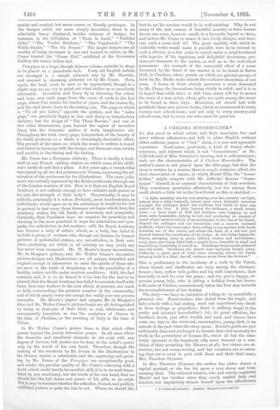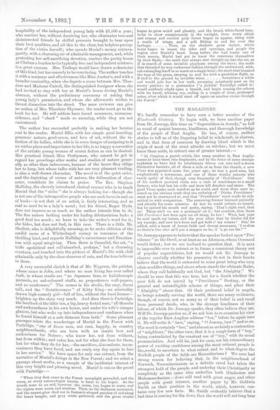A CHELSEA HOUSEHOLDER.* AN Art novel in which artists and
their associates live and move without affectation, and talk in plain English, without either assthetic jargon or " fast " slang, is a new and agreeable experience. Good-sense, good-taste, a kind of breezy whole-•
someness, and interest which is not " toomultuous," as Mr. Lillivick said of Miss Petowker's dancing, but is well sustained ; such are the characteristics of A °lois= Householder. The
author's name is not placed upon the title-page, but that the story is written by a woman there is ample evidence ; albeit, the close observation of nature, in which Muriel Ellis, the " house- holder," might compete with Mr. Jefferies' famous " Game- keeper " himself, is an unusual characteristic of lady novelists.
They sometimes generalise effectively, but few among them could sketch a little bit in the New Forest as this is sketched :—
" A light, sunshiny shower was passing over the country—so light, indeed, that a white butterfly, intent upon Berea domestic concerns amongst the cabbages below the windows, had failed to take any notice of the fact. A little beyond the cabbages, a small, brown wren — a mere atom of fluff and feathers—was hopping up and down some beanstalks, jerking its tail, and producing an amount of sound which seemed utterly disproportionate to the size of its throat. Beyond the cabbages and the beanstalks was a narrow, enclosed paddock, where the corncrales were calling to one another with harsh iteration out of the clover, and where the back of a red cow just showed beyond the hawthorns of the hedge. At this hedge began the Forest, sweeping away in great, billowy curves and undulations ; every bare spot being filled with a purple haze, beautiful in itself and beautifying everything it rested nn. Raindrops innumerable glittered over the earth. Overhead, the clouds were hurrying briskly away. Suddenly, a great gust of wind came sweeping across the forest, bringing with it a faint, far-off, resinous scent from the fir-trees."
This is preliminary to the incidents of a walk in the Forest, where linnets and chaffinches are busy among the chestnut- flowers ; bees, yellow with pollen and big with importance, dash hurriedly to and fro over the grass ; and the grave, happy, ob- servant young lady, who is taking a holiday from her house- hold cares at Chelsea, unconsciously takes the first step towards the accomplishment of her destiny.
The story—we have no intention of telling it—is essentially a pleasant one. Novel-readers who shrink from the tragic, and hate a book with a bad ending, need not apprehend any shock
to their feelings or prejudices ; there is nothing tragic in the pretty and talented householder's lot ; its great affliction, her brother's death, just after wealth, and rank, and leisure have come too late to the worn-out, consumptive, young clerk, is an
episode of the past when the story opens. Muriel's griefs are just sufficiently deep and prolonged to furnish that vital necessity for truth in the portraiture of human life, which all bat the abso-
lutely ignorant or the hopelessly silly must demand as a con- dition of their accepting the likeness at all; her virtues are at-
tractive, but not overpowering, and her vexations are so amus- ing that one is sorry to part with them and their chief cause, Mrs. Theodore Skynner.
In Mrs, Theodore Skynner, the author has either drawn a capital portrait, or she has hit upon a very clever and true- seeming ideal. The widowed relative, who bad utterly neglected Muriel and her brother when they sorely needed help and kindred, but impulsively throws herself upon the affectionate
• A Chelsea ilousehoWer. London : Sampson raw and 0o.
hospitality of the independent young lady with £1,500 a year ; who masters her, without deceiving her, who eliminates true and disinterested friends by skilful pressure brought to bear upon their best qualities, and all thia to the clear, but helpless percep- tion of the victim herself; who spends Model's money extrava- gantly, with a charming air of admirable management, and, while protesting her self-sacrificing devotion, renders the pretty house at Chelsea a burden to its typically free and independent mistress, is a great success. Mrs. Trollope would have drawn a character of this kind, but too coarsely to be convincing. The author touches it with a neatness and effectiveness like Miss Austen's, and with a broader comicality, when she depicts a scene between Mrs. Theo- dore and Madame Cairoli, the distinguished foreigner whom she had invited to stay with her at Muriel's house during Muriel's absence, without the preliminary ceremony of asking that young lady's permission, and whom she afterwards wishes to • thrust dinnerless into the street. The mere reviewer can give no notion of Mrs. Theodore Skynner; the reader must go to the book for her. He will seldom have found meanness, unreason- ableness, and " cheek " made so amusing, while they are not caricatured.
The author has succeeded perfectly in making her heroine real to the reader. Muriel Ellis, with her simple good-breeding, generous nature, good-sense„ and love of art, without the in- fection of its follies, while she is in some danger of assigning to it an undue place and importance in her life, is as happy a corrective of the artistic young woman of recent fiction as can be desired. Her practical friend, Miss Prettyman, who cannot be got to regard her prowlings after moths and studies of nature gener- ally as other than indecorous, because of the hours they oblige her to keep, but whose talks with her are very pleasant reading, is also a well-drawn character. The novel is of the quiet order, and the depicting of scenes of nature, the delineation of char- acter, constitute its claims to praise. The Rev. Stephen Halliday, the cleverly introduced clerical rescuer who is to teach Muriel that the " niche " she is always looking for—though she is not one of the introspective people who are such bores in and ou of books—is not that of an artist, is fairly interesting, and as real as need be in a lady's novel ; but his friend, Roger Hyde, does not impress us so much as the author intends him to do.
The fine nature lurking under his loafing dilettanteism lurks a good deal too much ; we have to take the writer's word for it; she hides, but does not find, in this case. There is a little Mr.
Skellett, who is delightfully amusing, as he seeks oblivion of the sordid cares of a Whitechapel curacy in romances of the thrilling kind, and regards Halliday's earnestness and Erastian- ism with equal misgiving. Then there is Gamaliel, the cat, "a trifle egotistical and self-absorbed, perhaps," but a charming creature, and touched into the picture of Muriel's life with skill attainable only by the close observer of cats, and the true believer in them.
A very successful sketch is that of Mr. Wygram, the painter, whose name is John, and whom no man living has ever called Jack, in whose studio are "no Japanese fans, or kaleidoscopic parasols, no sad-coloured stuffs, no preposterous wall-papers, and no sunflowers." The scenes in his studio, the easy, fluent talk, and the " flirtatiousness " of Kitty King—an admirably drawn high-comedy girl—full of fun, without the least licence— brighten up the story very much. And then there is Partridge, the landlord of the little inn; a big, heavy-footed man," all thumbs and awkwardness in his own house, and under his wife's vinegar glances, but who woke up into independence and readiness when he found himself at a safe distance from both." Some pleasant passages relate the wanderings of Muri,e1 in the Forest with Partridge, "one of those men, not rare, happily, in country neighbourhoods, who are born with an innate love and enthusiasm for Nature' who know her, not from without, but from within ; and value her, not for what she does for them, but for what they do for her,—the sacrifices, discomforts, incon- veniences they have faced, and are ready any day again to face in her service." We have space for only one extract, from the narrative of Muriel's doings in the New Forest; and we select a passage about moths, as a sample of the incidental interest of this very bright and pleasing novel. Muriel is out on the prowl with Partridge :—
" When they first came to the Forest moonlight prevailed, and the moon, as every entomologist knows, is fatal to his hopea. As the month wore to an end, however, the moon, too, began to wane, and the nights were warm and stades& Then, as the darkness increased, a.nd the sunset-glow died out in fantastic-shaped patches of red along the lower boughs, and grey mists gathered, and the great trunks
began to grow weird and ghostly, and the broad, white-faced hem- locks to show conspicuously in the twilight, from every chink and cranny and crevice grey forms began to appear, rising with a rustle of wings, and a soft flitting to and fro over the
herbage Then, as the shadows grew darker, whole hosts began to haunt the rides and openings, and people the region over Muriel's head. Long before she had learnt one of their names, Muriel had got to know the creatures themselves by their flight,—the meth that always shot straight up into the air, as if in search of some invisible playmate among the stars ; the moth that threaded its way corkscrew fashion through the tinder wood, with- out entangling itself in so much as a single briar; the moth that haunted the tops of the grass, swaying to and fro with a pendulum flight, as if tied to the ground by invisible wires Sometimes a white owl would join her in hor walk, swooping noiselessly past on its snowy pinions ; or a goatsucker [' a jarbird,' Partridge called it] would suddenly alight upon a branch, and begin rousing the echoes with its harsh, whining cry, ending in a couple of clear, prolonged notes, after which it would start off again on another cruise through the Forest."



































 Previous page
Previous page